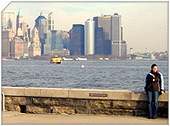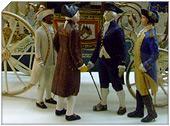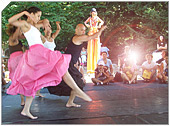Getting Started
Index
NYC Neighborhoods
Manhattan
Brooklyn
Queens
Bronx
Staten Island
NYC Icons
Chrysler Building
Flatiron Building
Empire State Building
Safe NYC
NYPD
FDNY
NYC Weather
NYC Climate
NYC Weather Forecast
Winter Season
Spring Season
summer Season
Fall Season
NYC History & Politics
New York City History
Tammany Hall and Politics
New York City Politicians
New York City Personalities
Culture of Gotham City
Culture of the city
Cultural diversity
City in popular culture
|
Mel Brooks (born June 28, 1926) is an Academy Award-winning American director, writer, comedian, actor and producer best known as a creator of broad film farces and comedy parodies.
Career
He started out in show business as a stand-up comic, telling jokes and doing movie-star impressions. He found more rewarding work behind the scenes, becoming a comedy writer for television. He joined the hit comedy series Your Show of Shows with Sid Caesar and Carl Reiner.
In 1960, an attack of gout (and the aftermath of the surgery done to relieve it) left him allegedly feeling like a 2000-year-old man. This became the persona of The 2000-Year-Old Man, the focus of ad-libbed comedy routines and comedy records, with Carl Reiner as his straight man.
Mel Brooks later moved into film, working as an actor, director, writer, and producer. Brooks' first film was The Critic (1963), an animated satire of arty, esoteric cinema, conceived by Brooks and directed by Ernest Pintoff. Brooks supplied running commentary as the baffled moviegoer trying to make sense of the obscure visuals. The short film won an Academy Award.
With Buck Henry, Brooks created the successful TV series Get Smart, starring Don Adams as a bumbling secret agent. This series added to Brooks' reputation as a clever satirist.
Brooks' first feature film, The Producers, was a black comedy about two theatrical partners who deliberately contrive the worst possible Broadway show. The film was so brazen in its satire (its big production number was "Springtime for Hitler") that the major studios wouldn't touch it, nor would many exhibitors. Brooks finally found an independent distributor, which released it like an art film, as a specialized attraction. Despite horrible reviews ("thoroughly vile and inept") and disappointing boxoffice returns[citation needed], the film received an Oscar for Best Original Screenplay. The film became a smash underground hit, first on the nationwide college circuit, then in revivals and on home video. Brooks later turned it into a musical, which became one of the most popular Broadway shows.
Among his most popular films have been Blazing Saddles (1973, co-written with Richard Pryor, Andrew Bergman, Norman Steinberg and Alan Uger), and Young Frankenstein (1974, co-written with Gene Wilder). He followed these up with an audacious idea: the first feature-length silent comedy in four decades. Silent Movie (1976) featured Brooks in his first leading role, with Dom DeLuise and Marty Feldman as his sidekicks.
Brooks developed a repertory company of sorts for his film work: performers with three or more Brooks films to their credit include Gene Wilder, Dom DeLuise, Madeline Kahn, Harvey Korman, Cloris Leachman, Ron Carey and Andréas Voutsinas. Dom DeLuise has appeared in six of Brooks' 12 films, the only person with more appearances being Brooks himself.
In 1975, at the height of his movie career, Brooks tried TV again with When Things Were Rotten, a Robin Hood parody that lasted only 13 episodes. Nearly 20 years later, Brooks mounted another Robin Hood parody with Robin Hood: Men in Tights.
In 1980 Brooks became interested in producing the dramatic film The Elephant Man (directed by David Lynch). Knowing that anyone seeing a poster reading "Mel Brooks presents The Elephant Man' would expect a comedy, he set up the company Brooksfilms. Brooksfilms has since produced a number of non-comedy films, including David Cronenberg's The Fly, Frances, and 84 Charing Cross Road, starring Anthony Hopkins and Anne Bancroft, as well as comedies, including Richard Benjamin's My Favorite Year.
The 1980s saw Brooks produce and direct only two films, the first being The History of the World Part 1 in 1981, a tongue-in-cheek look at human culture from Ancient Rome to the Spanish Inquisition. As part of the film's soundtrack, Brooks, then aged 55, recorded a rap entitled "It's Good to Be the King", sending up Louis XVI and the French Revolution; it was released as a single, and became an unlikely US disco hit. His second release came in 1987 in the form of Spaceballs, a parody of Star Wars. Both films featured him in multiple roles. He also starred in the 1983 remake To Be or Not to Be.
Brooks' most recent success has been a transfer of his film The Producers to the Broadway stage. Brooks also had a vocal role in the 2005 animated film Robots. He is currently working on an animated series sequel to Spaceballs, expected to premiere in 2007.
Brooks is one of the few who have received an Oscar, Emmy, Tony, and Grammy. He was awarded his first Grammy award for Best Spoken Comedy Album in 1999 for his recording of The 2000 Year Old Man in the Year 2000 with Carl Reiner. His two other Grammys came in 2002 for Best Musical Show Album, for the soundtrack to The Producers, and for Best Long Form Music Video for the DVD "Recording the Producers - A Musical Romp with Mel Brooks". He won his first of four Emmy awards in 1967 for Outstanding Writing Achievement in Variety for a Sid Caesar special. He went on to win three consecutive Emmys in 1997, 1998, and 1999 for Outstanding Guest Actor in a Comedy Series for his role of Uncle Phil on Mad About You. He won his three Tony awards in 2001 for his work on the musical, The Producers. He won Tonys for Best Musical, Best Original Musical Score, and Best Book of a Musical. Additionally, he won a Hugo Award and a Nebula Award for Young Frankenstein. In a 2005 poll to find The Comedian's Comedian, he was voted #50 of the top 50 comedy acts ever by fellow comedians and comedy insiders. Three of Brooks' films are on the American Film Institute's list of funniest American films: Blazing Saddles (#6), The Producers (#11), and Young Frankenstein (#13).
Brooks and his wife Anne Bancroft acted together in Silent Movie and To Be or Not to Be, and Bancroft also had a bit part in the 1995 film Dracula: Dead and Loving It. Years later, the Brookses appeared as themselves in the fourth season finale of Curb Your Enthusiasm, spoofing the finale of The Producers. It is reported that Bancroft encouraged Brooks to take The Producers to Broadway where it became an enormous success, as the show broke the Tony record with 12 wins, a record that had previously been held for 37 years by Hello, Dolly! at 10 wins. Such success has translated to a big-screen version of the Broadway adaptation/remake with actors Matthew Broderick and Nathan Lane reprising their stage roles, in addition to new cast members Uma Thurman and Will Ferrell. As of early April 2006, Brooks had begun composing the score to a Broadway musical adaptation of Young Frankenstein, which he says is "perhaps the best movie [he] ever made." The world premiere is scheduled for Seattle's most historic theatre (originally built as a movie palace), The Paramount Theatre, on August 7, 2007, after which it is scheduled to commence at the Hilton Theatre, New York, on October 11, 2007.
|
New York City Search
Quick NYC
|



 New York Weather Forecast
New York Weather Forecast
 Ethnic composition
Ethnic composition


















